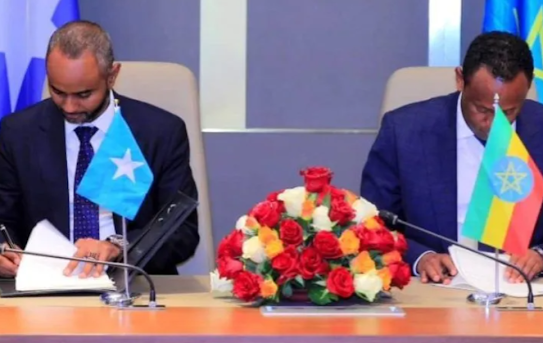Ethiopia-Somalia Tensions: AU’s Diplomatic Gambit Amid Geopolitical Strain
To defuse the escalating tensions between Ethiopia and Somalia, the African Union's Peace and Security Council (PSC) has taken decisive measures. Former Nigerian President Olusegun Obasanjo has been appointed to facilitate negotiations and mediate the delicate geopolitical situation stemming from the recent agreement between Ethiopia and Somaliland.
Somaliland's recent move to cede sovereignty over a marine port and military facility on the Red Sea to Ethiopia, as outlined in the agreement signed on January 1st, has intensified the geopolitical complexities in the region. This decision by Somaliland, a breakaway province seeking international recognition since 1991, has triggered heightened sensitivities. In response, Somalia has issued a war declaration, harking back to historical conflicts between the two nations.
Examining the historical context, Ethiopia and Somalia have a track record of territorial disputes, particularly with contested boundaries in 1977. The 2006 Ethiopian military intervention in Somalia as part of the global war on terrorism further adds to the historical tensions. The current situation, exacerbated by Somaliland's agreement with Ethiopia, risks reigniting past animosities.
Obasanjo faces a formidable diplomatic challenge in mediating between Ethiopia and Somalia, with the added complexity of Ethiopia denying entry to a plane carrying its representatives to Somaliland. The African Union emphasizes the importance of adhering to fundamental principles and international law in bilateral and international relations, urging a diplomatic resolution to prevent the brewing conflict.
The IGAD Summit, convened to address the escalating tensions over the Ethiopian-Somaliland deal, seeks a resolution. The African Union, considering Somaliland as a province of Somalia, emphasizes the need for careful mediation to prevent external interference and achieve a resolution acceptable to all parties involved.
Somalia's steadfast stance includes a refusal to engage in dialogue with Ethiopia unless the latter reverses its agreement with Somaliland. Accusing Ethiopia of violating sovereignty and territorial integrity through an allegedly illegal agreement, Somalia insists on the annulment of this pact as a precondition for meaningful mediation efforts.
Diplomatic challenges were further discussed at an IGAD summit in Kampala, Uganda, where the need to prevent external meddling was emphasized. Somalia's reluctance to engage in talks with Ethiopia complicates diplomatic efforts, setting stringent conditions for any potential dialogue.
The primary obstacle to diplomatic negotiations remains Ethiopia's deal with Somaliland. Somalia insists on the reversal of this agreement as a prerequisite for meaningful dialogue. Olusegun Obasanjo's intervention aims to navigate these challenges and find a resolution that upholds the sovereignty and territorial integrity of Somalia.




Comments
Post a Comment